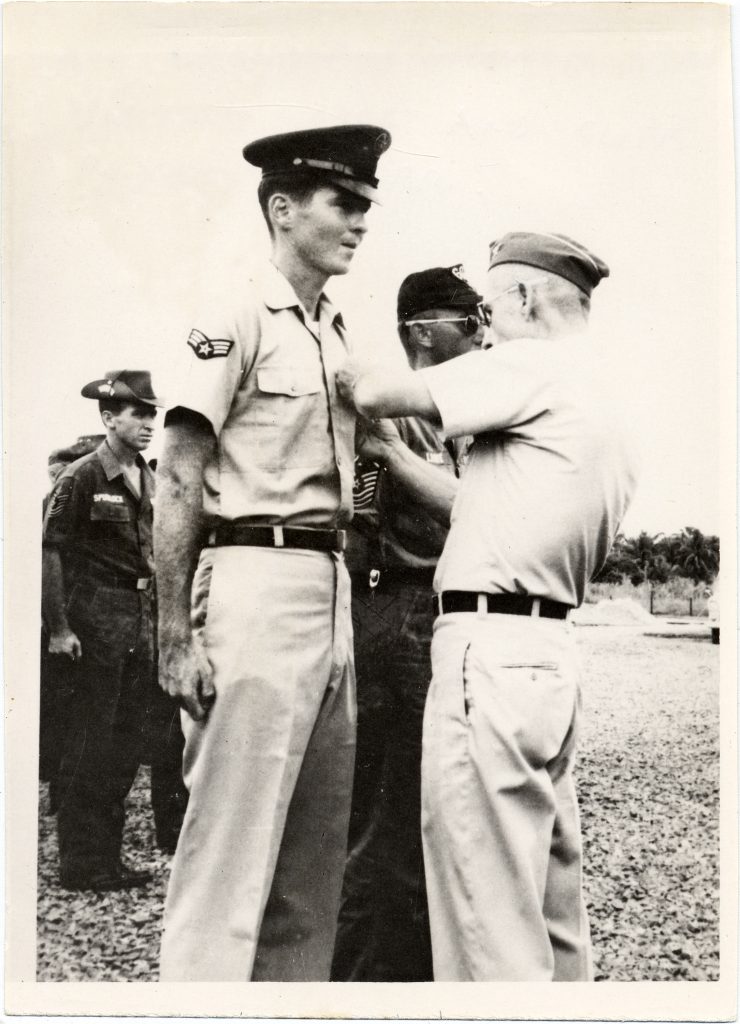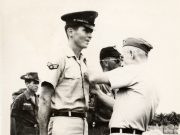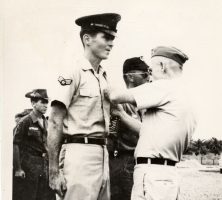Georgia native Leonard Phillip Matlovich was one of the earliest activists to challenge the status of gays and lesbians in the U.S. military.
Born July 6, 1943, in Savannah, at Hunter Air Force Base, Matlovich spent much of his early life in South Carolina. He enlisted in the Air Force at the age of nineteen and rose to the rank of technical sergeant. He would earn both a Purple Heart and a Bronze Star for his service in the Vietnam War (1964-73).
Though he identified as a conservative, Matlovich engaged with the political left during his post-military career in pursuit of gay rights. Stationed in Florida in the early 1970s as a trainee for military programs on race relations, Matlovich explored gay nightlife in Pensacola but kept his sexual identity hidden from military superiors.

In 1974 Matlovich wanted to test the military’s policy of forbidding gays and lesbians to serve openly. He met activist Frank Kameny in Washington, D.C. during the summer of 1974 and, after some discussion, agreed to challenge the ban.
Matlovich outed himself on March 6, 1975 via a letter to the commanding officer at Langley Air Force Base, near Hampton, Virginia. Matlovich explained to the Black commanding officer that he hoped his case would set a precedent like that set by Brown v. Board of Education (1954), which overturned the separate-but-equal standard set in Plessy v. Ferguson (1896).
Matlovich would later credit Black southerners with spurring his own activism. He told the New York Times that “when the Blacks were seeking freedom in the sixties, I was against them; now they’re defending me.” He would later say, “Everything I am today I owe to Black Americans.”
The subsequent media avalanche brought Matlovich and the gay-rights movement national stature as well as coverage from the New York Times, the CBS Evening News, and other prominent outlets. In the cover story from the September 8, 1975, issue of Time magazine—in which he became a visible symbol of the early gay-rights movement—Matlovich claimed his identity in cover type that read “I Am a Homosexual.”
The Air Force offered to keep Matlovich in active duty if he would sign a pledge to never engage in homosexual sex again. When he refused, he was given an honorable discharge on October 21, 1975. Matlovich won an order for reinstatement in federal appeals court in September 1980, but remained convinced that the military would find a reason to discharge him a second time and that an eventual case would be rebuffed by a conservative Supreme Court. And so, rather than report to duty, he accepted a financial settlement of $160,000 for back pay and damages. In confirming Matlovich’s separation from service, a spokesman for the Air Force said that the military continued “to regard homosexuality as fundamentally inconsistent with military service.”
The military’s policy of exclusion would not change until 1993 when President Bill Clinton proposed the policy of “Don’t Ask, Don’t Tell.” Intended as a compromise, the policy, which was formally adopted in 1994, allowed gays and lesbians to serve—so long as their sexual identity remained private. Gay and lesbian military personnel were still subject to discrimination, and in the fifteen years after the policy’s adoption, more than 13,000 service members were discharged for “homosexual conduct,” according to a 2009 report produced by the Servicemembers Legal Defense Network. In 2010 Congress passed legislation repealing “Don’t Ask, Don’t Tell.” The new law, which allowed gays and lesbians to serve openly, took effect the following year.
By the time of his separation from the military, Matlovich had become the subject of a TV movie, Sergeant Matlovich vs. the U.S. Air Force, and had protested Anita Bryant’s “Save Our Children” campaign, which led to the overturning of a gay-rights ordinance in Miami. He had moved in 1979 to San Francisco, California, then to the nearby Russian River town of Guerneville in 1981, where he opened a pizzeria. By mid-1981, Matlovich had connected with the National Gay Task Force and explored a sale of his business to grant him more time for public activism.
Matlovich sold the pizzeria in 1984 and continued life as an activist until 1986, when he began to show symptoms of infections that were associated with the HIV virus. Experimental treatments with AZT were not effective.
Matlovich announced in 1987 that he was HIV-positive. During the Second National March on Washington for Lesbian and Gay Rights in 1987, he and other activists attended a commemoration of the life of Harvey Milk at Congressional Cemetery in Washington, D.C.
After a final public speech given that May, Matlovich died of complications from HIV/AIDS on June 22, 1988. He is buried in Congressional Cemetery in Washington, D.C. His marker reads, “When I was in the military, they gave me a medal for killing two men and a discharge for loving one.”






